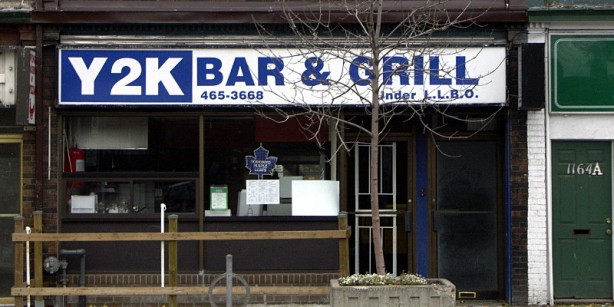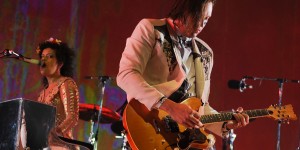 Music
Music
TRENDSPOTTING: '00s revival in a sped-up nostalgia cycle
by Richard Trapunski
March 29, 2012
It doesn’t seem so long ago that “retro” meant twenty years. Let twenty years pass and you were free to look back on fashion, film and music with the purposes of re-appropriation, satire or revival. Once that ironic distance coalesced, anything was fair game.
Recently, it seemed that that cycle was right on schedule. Beavis and Butthead had returned to MTV, professional sports teams were reverting to their ‘90s uniforms and college/grunge rock was being revived by bands like Yuck (a group too young to have experienced it firsthand). But look closer and you might see that the nostalgia cycle is actually way ahead of schedule. Beyond the steady stream of ‘90s nostalgia is a slower, pricklier, but hard to deny second wave of more recent nostalgia, nostalgia for an era that’s barely behind us.
A recent Guardian article pointed out a curious tendency in the London underground party scene. According to the article, young trendsetters (or, inevitably, “hipsters”) are eschewing the cutting edge to dance to “guitar music made between 2002 and 2007.” Fair, the British music press has a tendency to inflate relatively small movements into big sweeping statements about an entire culture. The article’s claim that “this passion for the indie of yesteryear suggests a dim future for new bands” seems like a bit of an overreach, but there’s evidence that this hurried nostalgia is not an isolated fluke. It’s happening here, too, at dance parties, record stores and music festivals.
Take a look at the lineup for this year’s Osheaga. One of Canada’s biggest music festivals, the Montreal event is relatively indicative of the summer festival circuit as a whole. High-billed bands like the Shins, Franz Ferdinand and Bloc Party all seem like harbingers of a certain moment in indie music culture, and, strangely, that moment is barely a decade old.
Pitchfork’s 2003 review of The Rapture’s breakout album, Echoes, predicted a movement. “Change has been boiling under ever since the decade clicked to double zeros,” went the memorable screed, penned by site-founder Ryan Schreiber. “Finally, we are shaking off the coma of the stillborn slacker 90s and now there is movement.”
More boldfaced hyperbole, sure, but for at least a little while the review proved accurate – in the years that followed, bands like Interpol, Bloc Party and Franz Ferdinand shot to micro-fame. Reared on the same seminal Joy Division, Wire and Gang of Four records, they all fit comfortably fit into the category of “post-punk revival” or “dance punk,” each evoking the same nervy, wiry, danceable rock sound that forced the rock critic hive mind to way overuse the word “angular.” It’s no coincidence that the Rapture review also coincided with Pitchfork’s own rise to cultural gigantism.
Like most influential genre movements, the post-punk revival was eventually watered down, commodified and repackaged in blander, more commercial forms (the Killers and the Bravery were the Candlebox of dance punk), while meanwhile, forward-thinking acts like LCD Soundsystem propelled the movement in a different direction by introducing elements of humour and more clubby dance sounds. And soon enough, more earnest, emotional bands like Arcade Fire and Death Cab For Cutie rode in on the back of The OC to become the dominant indie rock sound.
In the past, that kind of trajectory would likely unfold over the course of at least a decade, but this one took place in pretty much five years. But this mini-movement took place just as music blogs were rising in prominence and, consequently, the hype cycle was speeding up (remember chillwave?), while new social networking tools like Tumblr have created a new premium on nostalgia.
And so, it didn’t take long for the post-punk revival to flame out. The Rapture crushed under the weight of expectation (and some Behind The Music-style antics), Interpol overstayed their welcome to the point that many stopped caring and Franz Ferdinand only recently seem to be going through a reevaluation after years of being taken for granted. By 2006 or so, that revolutionary moment in music was already over. But a little over a half decade later, it’s ripe for re-plucking.
Less than morphing into a new, more present-friendly aesthetic, the return of acts like The Rapture evokes a kitschified set of stillborn signifiers: Brooklyn hipness, coke-fuelled indie dance parties, and the emergence of Coachella as a major cultural force. As a 25 year old, that mythologization of the recent past often makes me feel old beyond my years.
I was just finishing high school when Death From Above 1979 were riding their album, You’re A Woman, I’m A Machine to more popularity than you might expect from a yelpy thrash-pop band from Toronto. I remember hearing them on the radio a fair bit, but that didn’t prepare me for the scene I witnessed at their homecoming show on their recent reunion tour. Much of the crowd looked too young to have fully enjoyed them (or at least seen them live) the first time around, and so their one-album legacy seemed enshrined enough to greet the band with a shit-losing hero’s welcome (of course, this was nothing compared the riot that greeted them in Austin).
Similarly, I was in my first year of university when Natalie Portman declared in Garden State that the Shins would change my life. After the relative shrug that granted the 2006 album Wincing The Night Away, it looked like James Mercer had tired of the Shins, firing his whole band and instead collaborating with producer du jour Danger Mouse in the new project, Broken Bells. But the market seems ripe now for a now-entrenched early ‘00s band to re-appear, and so, with the help of a new team of hired guns, Mercer has re-emerged with an album (Port Of Morrow) that sounds convincingly like vintage Shins. No longer expected to change anyone’s life, the band is now satisfied with sounding like its own history.
But when that history is suddenly so in demand, who can blame them?
Tags: Music, News, arcade fire, Bloc Party, Broken Bells, Death Cab For Cutie, Death From Above 1979, Gang Of Four, Interpol, Joy Division, LCD Soundsystem, the bravery, The Killers, the rapture





